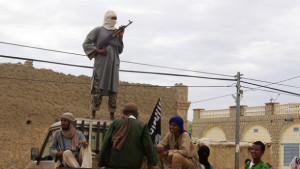
Back in the day the wave of Arab “color revolutions” bypassed Algeria, though it overthrew the regimes in neighboring Tunisia and Libya. The Algerian military, which has many years’ experience in armed fighting against terrorism, managed to keep the situation under control. Moreover, the West, primarily the United States and France, did not interfere in Algeria’s domestic affairs, since they understood that thugs would not get kid gloves treatment there, and the Algerian army, with its state-of-the-art weaponry furnished by Russia, is capable of repelling any external intervention, even the one involving NATO and the Wahhabi regimes in Saudi Arabia and Qatar. Large oil and gas resources also provided domestic financial stability.
In addition, the Algerian special forces did a bang-up job, so the local “jihadists” left in large numbers to go fight in hot spots in the Arab world: in Libya, Syria and Iraq.
However, the start of the military operation by the United States, a number of NATO countries and America’s Wahhabi vassals in Iraq and Syria prompted the rise of a new wave of radical Islamism in Algeria. Moreover, it came in a much more rigid and uncompromising form than the methods used by al-Qaida of the Islamic Maghreb (AQIM), which mainly attacks government officials and law enforcement agencies, organizes kidnappings and is involved in crime. Their most notorious act of terrorism was taking of a large group of foreign hostages at the gas complex in In Amenas in January 2013.
After that, the army again began carrying out systematic large-scale operations. Security forces significantly increased their presence and activity in the troubled south of the country .They also initiated fixing of the leaky borders with Mali, Niger and Libya, which is exactly where the infiltration of Islamic militants had been coming from. By the next summer, terrorist activity in Algeria’s Sahara and Sahel zone has sharply decreased. Under the circumstances, most of the AQIM bands took refuge in the mountainous northern regions of the country, and some settled in the surrounding areas of eastern Tunisia, Libya and Mali.
Striving to maintain his influence over all of North Africa, the leader of AQIM, Abdelmalek Droukdel, refused to send his “fighters” to Syria. As a result, AQIM field commanders received reinforcements from the Islamic Stateagents, Jabhat al-Nusra and Qatari special forces, who used money and indoctrination to win over a significant number of Algerian jihadists. In August and September, many commanders of AQIM pledged their loyalty to the IS leader Abu Bakr al-Baghdadi as the new “chief” of global Islamism. In fact, they broke with Droukdel and began to position themselves as the foremost Islamist apparatus in Algeria in the eyes of the foreign sponsors, especially Qatar and the private Islamic funds of Saudi Arabia, Kuwait and the UAE. In September, there was a massive flow of AQIM militants from Algeria to Iraq and Syria. So the question arises anew: what happens when they come back? After the Algerian mujahideen returned from Afghanistan in 1989 and 1990, the country was wracked by a civil war that killed 300,000 people.
That’s why the authorities are reinforcing security measures, especially at strategically important sites of oil and gas infrastructure. Areas in the Algerian Sahara and the forested, mountainous terrain in northern regions are particularly vulnerable, as are large cities, where sleeping terrorist cells find good cover. The high levels of poverty and unemployment in these areas make it easier for the militants to recruit partisans and complicate terrorist attacks prevention. For the time being, the government succeeds in stymieing coordination between the north and the Sahara and Sahel terrorist groups. Recognizing the danger posed by Algerians who return after fighting abroad, the Algerian intelligence agencies are taking decisive measures to identify recruitment channels and dismantle support networks. More monitoring is being done for Islamic preachers who promote extremist slogans. However, recently the militants got an additional funding source for their activities in the form of drug trafficking.
The Sahara-Sahel zone remains the most dangerous territory of terrorist activity. Because of the situation in northern Mali, the Algerians are forced to maintain a sizable troop presence at the southern border, which is aimed at stopping terrorists from slipping via that country. Algeria is reluctant to open the border with Mali, which upsets the Tuareg, who control the delivery of goods from Algeria to the Kidal and Gao regions. At the same time, Algeria wants to use the Sahel “quartet” — Algeria, Mauritania, Mali and Niger — as a form of joint opposition to armed extremism and cross-border crime. There has already been some tangible results to this end. In September Algeria hosted talks between the Malian authorities and six Tuareg rebel groups to work out a solution of the crisis in northern Mali.
However, terrorists’ collaboration with drug traffickers, including cannabis suppliers from Morocco, complicates the efforts of the Algerian secret services to dismantle AQIM’s networks and its related entities. On top of that is outpouring of illegal immigration from “Black Africa” transiting through Algeria into Europe, generating an increase in transnational organized crime.
It is clear, that terrorism has become a regional problem of multidimensional nature that is affecting the stability and security of all the countries bordering Algeria. The connection of the Algerian terrorist groups to the Islamic State is starting to make it an international issue, given that millions of natives of Algeria are taking up residence in France and tens of thousands – in Belgium, Spain, Italy and Switzerland. And there they continue to be indoctrinated by ISIS agents with the financial backing of the Arab monarchies.
So, Algerian authorities are facing challenging times ahead.
Peter Lvov, Ph.D in political science, exclusively for the online magazine “New Eastern Outlook”.
